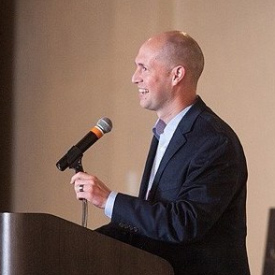New Year’s Thoughts for Teachers
Some believe the tradition of New Year’s Resolutions goes back as far as the second century B.C. Janus, a mythical king of Rome, stood at the head of the calendar with his two faces looking back on past events and forward to the future. King Janus eventually became the ancient symbol for resolutions. Some Romans looked for forgiveness from their enemies, exchanged gifts, and made commitments to better themselves before the New Year began.
January 1st became the first day of the New Year in 46 B.C., when Julius Caesar developed a calendar that more accurately reflected the seasons. The Romans named the first month of the year after Janus, who was believed to be the god of beginnings and the guardian of doorways. He was always depicted with those two faces, allowing him to look backward and forward at the same time. At midnight on December 31st, the Romans imagined Janus looking back at the old year and forward to the new.
School years divide into semesters with the New Year falling halfway through the academic year, providing teachers with a fresh start right in the middle. As far back as anyone can remember, teachers have claimed to have eyes in the back of their heads, somewhat like Janus. So, using those extra eyes to look back and gazing ahead at the New Year to come, let us consider some resolutions for 2012. After all, a new semester can mean a new beginning.
1. Take part in the Great Conversation
Classical school teachers, in general, realize the need to bring students into the “Great Conversation” – the beautiful dialogue with great men, great ideas, and great books of the ages. We assign marvelous readings, inventive writing assignments, creative projects, and engage them in Socratic dialogue.
Yet, many classical schools suffer a dearth of such opportunities for teachers, lacking sufficient conversation among those expected to lead such conversation. Teachers are frequently too busy to feed themselves, daily giving out more than they can take in. The end result, of course, is exhaustion and burnout. Reading thought-provoking, soul-nurturing works of literature so that we may teach them differs greatly from simply reading them and talking about them in community. Forming questions to pose to our students can differ greatly from engaging such questions ourselves.
We must take part in the Great Conversation ourselves, finding fuel for our own souls and minds. Put directly, read and talk. For the headmasters and other administrators who may be reading, labor to establish a culture of conversation – not “faculty meeting” checklists and “upcoming dates” chit-chat, but real dialogue – in your schools.
2. Keep your priorities in order
At the risk of bringing a wince or cringe to headmasters, teachers work too hard (as opposed to working wisely). Should teachers gather to compose a collective anthem, it would likely be entitled “We Cannot Do It All,” but this should be seen as a simple statement of fact rather than a lament. It’s true, after all. We cannot read it all, assign it all, teach it all, or plan enough. We must come to terms with the reality that it is far better to do a few things well than to do many things poorly.
Prioritize. What things are indispensable? What can realistically be accomplished? How do these lists differ from what you are currently trying to accomplish? You cannot do it all, nor should you try. As noted above, some teacher exhaustion arises from lack of meditation, conversation, and absence of a healthy school culture. But, some cases are self-induced.
No one ever says, at the end of life, “I wish I had spent more time at work” or “I wish I had spent less time with my family” or “I wish I had spent more time rushing around like a chicken with its head cut off” (to the sensitive reader, I apologize for the vivid Southern expression). So, slow down. Rest. Re-evaluate your own expectations and teach (or headmaster) in a way that honors the humanity of teacher and student alike.
“Be always at war with your vices, at peace with your neighbors, and let each new year find you a better man.” – Benjamin Franklin

Brian Phillips
Dr. Brian Phillips serves as a pastor in Concord, NC, where he lives with his wife and their four children.










